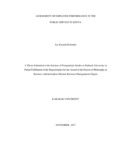ASSESSMENT OF EMPLOYEE PERFORMANCE IN THE PUBLIC SERVICE IN KENYA
Abstract
The purpose of this study was to assess employee performance in the public service in Kenya. The study was guided by the following specific objectives: to examine the role of personal attributes on employee performance in the public service in Kenya, to establish the consequence of leadership style on employee performance in the public service in Kenya, to analyze how team work practices influence employee performance in the public service in Kenya, to investigate the impact of organizational practices on employee performance in the public service in Kenya, and to evaluate the effect of sociocultural factors on employee performance in the public service in Kenya. Survey design was used in carrying out this study. The population of this study was 126,998 employees drawn from 20 ministries, 199 state corporations and 47 county governments. The study sample comprised of 370 respondents was obtained from 8052 employees drawn from 2 ministries, 1 state corporation and 2 county governments through stratified random sampling, simple random sampling and purposive sampling methods. A structured questionnaire, interview schedule, diaries and non-participatory observations were used to collect primary data. Document analysis of national and institutional policy documents and reports provided secondary data. Descriptive data was analyzed qualitatively. Content analysis was used to report on data obtained from interviews which was captured on tape recorder. Quantitative data were analyzed by the help of statistical package of social sciences (SPSS) version 21. The study findings were presented in simple frequencies and percentages, and summarized using Tables and Figures. Inferential statistics such as Chi-square for independence, correlations and regression analysis were carried out to test study hypothesis. The study concludes that there is a significant statistical association between employees’ level of performance and personal attributes, leadership style, teamwork practices, organizational practices and socio-cultural factors of the employees in the public service in Kenya. The study recommends that there should be quick adoption of new technologies and innovation to attain International Standards Organization so as to enhance the level of employees’ performance in public service. Additionally, there is need to enhance capacity of managers and human resource professionals to provide performance counselling to employees to enhance service delivery. The suggested strategies on improvement of devolution, harmonization of remuneration and best fit model will greatly have an impact on human resource policies and practices aimed at enhanced employee performance as well as knowledge base in the public sector.

